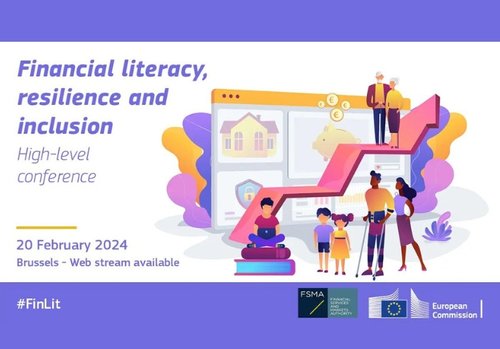Reporting back from FSMA and EC’s event: Financial literacy, resilience and inclusion

On 20 February 2024, the Belgian Financial Services and Markets Authority (FSMA) and the European Commission organised an event focusing on financial literacy and education. The topic is considered to be a priority for both the Belgian Presidency and the Commission, more specifically for Commissioner McGuinness.
On 20 February 2024, the Belgian Financial Services and Markets Authority (FSMA) and the European Commission organised an event focusing on financial literacy and education. The topic is considered to be a priority for both the Belgian Presidency and the Commission, more specifically for Commissioner McGuinness.
Jean-Paul Servais, Chair of FSMA, stressed that financial education is one of the legal mandates of the authority, and welcomed the ongoing legislative files at EU level that will enhance the current situation, including the Retail Investment Strategy (RIS), ESG ratings, and the Listing Act.
Commissioner McGuinness explained that the financial system needs to be as accessible as possible for all citizens. According to Eurobarometer, financial literacy is low, with many households struggling with unexpected income shocks and lacking savings. The Commission proposed in the past years two financial competence frameworks, aimed at both children and adults. She also stressed that the RIS is crucial, with support from the Belgian presidency. According to the Commissioner, there is a need to scrutinise the complexity of products sold by the financial sector, ensuring they are understandable for citizens. Moreover, it is essential to elevate the topic for upcoming elections and within the next Commission's priorities. The opening remarks made reference to the need for finding concrete solutions. You can read the full introductory speech here.
Maria Demertzis, Senior fellow at Bruegel, started by giving an overview of the state of play of financial literacy at EU level. She noted that people who were young, with lower income, and with a lower education background, were less likely to be knowledgeable about financial topics. The gender gap was also flagged as a relevant variable. Studies had shown that there was a lack of systematic monitoring of the financial literacy progress in the EU, and that the process of digitalisation increased the urgency for more financial knowledge.
The first panel focused on financial education. Pasquale Munafò, Chair of the Committee on Retail Investors of the International Organization of Securities Commissions (IOSCO), Fatima Zahra Aziz, Executive Director, Moroccan Foundation for Financial Education (FMEF), and Áine McCleary, Chief Customer Officer, Bank of Ireland were the guests invited to participate. They stressed the need for training teachers, as they could be in many cases the ambassadors of financial literacy. The methodology used had to be based on active teaching, interactive tools, and an evidence-based approach. They mentioned the importance of making this learning interesting, relevant and fun.
They concluded by explaining that it was key to define a common direction both at national and regional levels. Coordination and monitoring had to be strengthened, and the training had to be consistent and included in the curriculum.
The first keynote speech was given by Yoshiki Takeuchi, Deputy Secretary-General, OECD. He made reference to the urgency of having national strategies and cooperation across sectors.
The second panel built on financial resilience, in which participants shared best practices. Daniela Marconi, Head of division of the Directorate General for Consumer Protection and Financial Education of the Bank of Italy, provided 4 main aspects that had to be present: (1) innovation that brought protection and inclusion, (2) regulation, (3) (digital) financial education, and (4) access to information. According to Dieter Korczak, President, European Consumer Debt Network (ECDN), the focus should be on using a language that all citizens could understand. He noted that the Consumer credits directive had gone in the right direction, and would enhance consumer confidence and trust. More specifically, article 34 of the proposal referred to the improvement of financial education.
There were mentions of systems such as buy now, pay later, that in many cases implied a significant risk for people with limited financial literacy skills. Along these lines, Marja Nykänen, Deputy Governor of the Bank of Finland, called for focusing on vulnerable groups and for creating a network of stakeholders. She stated that Finland had the intention to be the most financially literate country of the world.
Katarina Ivankovic-Knezevic, Director for Social Rights and Inclusion at DG Employment, welcomed the invitation to the panel and stressed how relevant it was for the DG to be part of the debate, noting that pensions and social protection are an important part of financial literacy. Principle 20 of the European Pillar of Social Rights refers to access to essential services, which include financial services and digital communications. She raised a key question, on whether policies were reaching the end beneficiaries.
This panel included a Q&A round, and one of the questions led to a discussion on the role of workers. There was a general agreement on the need to include them, and the civil society in general, on the debate and interaction with regulators.
After the second panel, Jean-Paul Servais, Chair of FSMA, went through the main tasks of the authority. He gave 5 guidelines in order to make a successful financial product: (1) people, (2) legal framework, (3) keep it simple, (4) take risk, (5) money.
The second keynote speech of the day focused on the ongoing work of the Belgium Presidency. Vincent Van Peteghem, Belgium’s Deputy Prime Minister and Minister of Finance, referred to the upcoming informal ECOFIN meeting that was planned for 22-24 February in Ghent, in which one of the discussed topics would be financial literacy. He mentioned all the priority legislative files for the Presidency, that included the Review of the Recovery and Resilience Facility (RRF), the Crisis Management and Deposit Insurance (CMDI), the Capital Markets Union (CMU), Listing Act package, ESG ratings, and the Clearing package.
He considered that in the current times there is a tense relationship between households and financial institutions, and restoring confidence and trust is crucial. He also called for including the topic of financial literacy in the Commission’s strategic agenda. On the ways to improve confidence, he referred to having better access to information, better tools and instruments to compare financial products, and attractive EU-wide savings products.
The third and last panel of the event asked whether digitalisation in finance was a driver of financial inclusion. Wim Mijs, Chief Executive Officer of the European Banking Federation, noted that banks have a social role and have to be close to communities. He also stressed that public private partnerships are key and that there is a need to pay more attention to risks related to fraud and lack of information.
There was a general agreement about the fact that financial inclusion cannot go separate from digital inclusion. Anne-Sophie Parent, director of AGE Platform Europe, considered that it is important to think about how to rebuild trust in the systems, but also in people themselves. According to her, the most important challenges at the moment are lack of accessibility and interoperability. She also stressed the need to maintain cash, as it is currently the only form of public money that exists and it is essential. She welcomed the single currency package as it aimed to be inclusive, and because cash was intended to be maintained.
Tom Arends, Chief Executive Officer and Co-Founder of Peaks, referred to the main issues that he observed currently: (1) people find investment complex, (2) they do not have the money, (3) it feels risky, and (4) people are busy and do not have time. He focused on the need to build policies that protect consumers, and noted that there is at the moment asymmetry of knowledge between consumers and financial services providers.
Colleen Dube, Chief Executive Officer of the Irish National Adult Literacy Agency (NALA), noted that using plain language involves presenting information clearly to empower individuals to make informed decisions. She also believed that comparison tools play a crucial role, offering users the ability to assess different investment options comprehensively, aiding in their decision-making process. Mindy Parkkinen, Laureate of the Youth Policy Dialogue on the Future of Finance, provided the perspective of young citizens, and focused on starting to discuss financial literacy from an early age, so that young people could learn how to manage savings and spending.
Commissioner McGuinness and Rohit Chopra, Director of the US Consumer Financial Protection Bureau, engaged in a fireside chat that went deeper into the topic of financial literacy. The perspective of the US situation was included in the debate, and both participants went through the root causes related to financial literacy. They mentioned the fact that there was significantly more spending on financial marketing than on financial education, and the importance of measuring people’s habits in the financial marketplace. One of the most important gaps that had to be bridged regarded trust.
At the closing remarks Alexia Bertrand, Belgium’s State Secretary for Budget and Consumer Protection, made reference to one of the Presidency’s main motto, which was being a conscious consumer. Consumers need relevant information, and authorities have to improve facilitating that sharing. She welcomed a greater participation of retail in financial markets.
